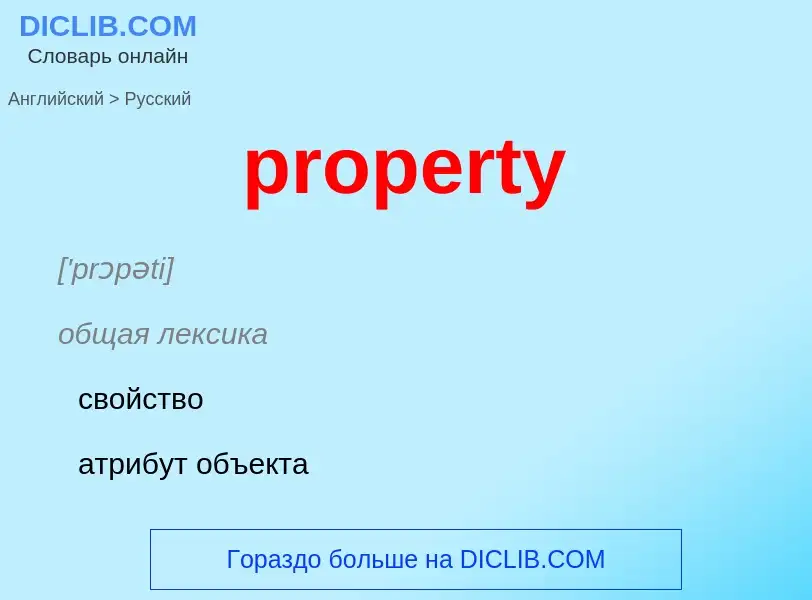Traducción y análisis de palabras por inteligencia artificial ChatGPT
En esta página puede obtener un análisis detallado de una palabra o frase, producido utilizando la mejor tecnología de inteligencia artificial hasta la fecha:
- cómo se usa la palabra
- frecuencia de uso
- se utiliza con más frecuencia en el habla oral o escrita
- opciones de traducción
- ejemplos de uso (varias frases con traducción)
- etimología
property - traducción al ruso
['prɔpəti]
общая лексика
свойство
атрибут объекта
характеристика, описывающая объект
качество
собственность, право собственности
атрибут
имущество
обстоятельство
собственность
способность
характеристика
строительное дело
владение
земельная собственность
застроенный земельный участок
хозяйство
нефтегазовая промышленность
признак
существительное
общая лексика
дом
недвижимость
достояние
свойство
качество
характеристика
способность
CМИ
театр. бутафория
реквизит (в театре, кино)
театр. пьеса [сценарий]
приобретенные для коммерческого использования
также [театр., кино] бутафория
свойство, качество
имущественный
экономика
собственность
имущество (любой внеоборотный актив, приносящий регулярный доход (основные средства, ценные бумаги и т. п.))
земельная собственность
земельный участок
имение
хозяйство
лицо
работающее по контракту (об артистах, спортсменах-профессионалах и т. п.)
юриспруденция
право собственности
театр
пьеса
сценарий и т. п.
приобретённые для коммерческого использования
«купленный материал»
разговорное выражение
работающее по контракту (об артистах, спортсменах-профессионалах и т. п.)
синоним
Definición
Wikipedia
.jpg?width=120)
Property is a system of rights that gives people legal control of valuable things, and also refers to the valuable things themselves. Depending on the nature of the property, an owner of property may have the right to consume, alter, share, redefine, rent, mortgage, pawn, sell, exchange, transfer, give away, or destroy it, or to exclude others from doing these things, as well as to perhaps abandon it; whereas regardless of the nature of the property, the owner thereof has the right to properly use it under the granted property rights.
In economics and political economy, there are three broad forms of property: private property, public property, and collective property (also called cooperative property). Property that jointly belongs to more than one party may be possessed or controlled thereby in very similar or very distinct ways, whether simply or complexly, whether equally or unequally. However, there is an expectation that each party's will (rather discretion) with regard to the property be clearly defined and unconditional, to distinguish ownership and easement from rent. The parties might expect their wills to be unanimous, or alternately every given one of them, when no opportunity for or possibility of a dispute with any other of them exists, may expect his, her, it's or their own will to be sufficient and absolute. The first Restatement defines property as anything, tangible or intangible, whereby a legal relationship between persons and the State enforces a possessory interest or legal title in that thing. This mediating relationship between individual, property, and State is called a property regime.
In sociology and anthropology, property is often defined as a relationship between two or more individuals and an object, in which at least one of these individuals holds a bundle of rights over the object. The distinction between "collective property" and "private property" is regarded as confusion since different individuals often hold differing rights over a single object.
Types of property include real property (the combination of land and any improvements to or on the ground), personal property (physical possessions belonging to a person), private property (property owned by legal persons, business entities or individual natural persons), public property (State-owned or publicly owned and available possessions) and intellectual property (exclusive rights over artistic creations, inventions, etc.). However, the last is not always as widely recognized or enforced. An article of property may have physical and incorporeal parts. A title, or a right of ownership, establishes the relation between the property and other persons, assuring the owner the right to dispose of the property as the owner sees fit. The unqualified term "property" is often used to refer specifically to real property.

.jpg?width=200)
